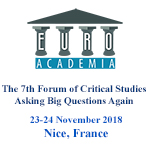Euroacademia Conferences
 Europe Inside-Out: Europe and Europeanness Exposed to Plural Observers (9th Edition) April 24 - 25, 2020
Europe Inside-Out: Europe and Europeanness Exposed to Plural Observers (9th Edition) April 24 - 25, 2020 Identities and Identifications: Politicized Uses of Collective Identities (9th Edition) June 12 - 13, 2020
Identities and Identifications: Politicized Uses of Collective Identities (9th Edition) June 12 - 13, 2020 8th Forum of Critical Studies: Asking Big Questions Again January 24 - 25, 2020
8th Forum of Critical Studies: Asking Big Questions Again January 24 - 25, 2020 Re-Inventing Eastern Europe (7th Edition) December 13 - 14, 2019
Re-Inventing Eastern Europe (7th Edition) December 13 - 14, 2019 The European Union and the Politicization of Europe (8th Edition) October 25 - 26, 2019
The European Union and the Politicization of Europe (8th Edition) October 25 - 26, 2019 Identities and Identifications: Politicized Uses of Collective Identities (8th Edition) June 28 - 29, 2019
Identities and Identifications: Politicized Uses of Collective Identities (8th Edition) June 28 - 29, 2019 The European Union and the Politicization of Europe (7th Edition) January 25 - 26, 2019
The European Union and the Politicization of Europe (7th Edition) January 25 - 26, 2019 7th Forum of Critical Studies: Asking Big Questions Again November 23 - 24, 2018
7th Forum of Critical Studies: Asking Big Questions Again November 23 - 24, 2018 Europe Inside-Out: Europe and Europeanness Exposed to Plural Observers (8th Edition) September 28 - 30, 2018
Europe Inside-Out: Europe and Europeanness Exposed to Plural Observers (8th Edition) September 28 - 30, 2018 Identities and Identifications: Politicized Uses of Collective Identities (7th Edition) June 14 - 15, 2018
Identities and Identifications: Politicized Uses of Collective Identities (7th Edition) June 14 - 15, 2018
Europe and the Politics of Convergence: Autonomy and Heteronomy in the European Social Imaginary
-
-

-
Presentation speakers
- Emanuel Crudu, Euroacademia (Paris, Lucca & Brussels)
Abstract:
With the creation and development of the European Union, an authentic ideology of convergence of political culture and behaviors took shape and empowered or justified politics of the “fait accompli”. The vision of lock-in effects of political integration optimistically envisaged the emergence of a post-national cosmopolitan spread of values through the complex mechanism of Europeanization as norms diffusion process. Yet the normative integration inside the EU generated political and identitarian asymmetries, claims on the power of naming what is central and peripheral to European identity, and inclusion/exclusion nexuses. Recent times have emphasized the fragility of European convergence with the re-emergence of centripetal nationalist, anti-Europeanist and new far right movements and parties that re-assert the importance of fundamental questions regarding the nature of the EU and the efficiency of European integration outside Pareto efficiency standards. This paper argues that the EU’s overenchantment with the achievements of integration and persistence in limited democratic politics with functional hierarchies and club-based priorities, facilitates the re-installment of a heteronomous divergence of national opportunist politics, re-emergence of old uncritical visions and social fears. Europe still needs to foster its own imaginary social significations as autonomy understood in the sense of Cornelius Castoriadis to be an unlimited critical questioning of existing norms and values in order to facilitate an authentic deliberative sphere and the formation of new European imaginary significations that go beyond old national(ist) habits.
-
Related Presentations

Critical Analysis of National Stereotypes in Popular Culture: Narrative of 'Evil Hungarians' in the Czech Historical Discourse
- Jan Květina

The Sources of a Modern Idea of United Europe
- Vytautas Sinica

Culture-Led Regeneration as a Strategy for City-Branding: Can the 'Museumisation' of the City be Sustainable in the Long Term?
- Claudia Anzani

The Bold Feminist
- Eva Dieteren

The Relation between Cultural Tourism and Traditional Churches Art in Romania’s Country Sites
- Andreea Marin Pantelescu













